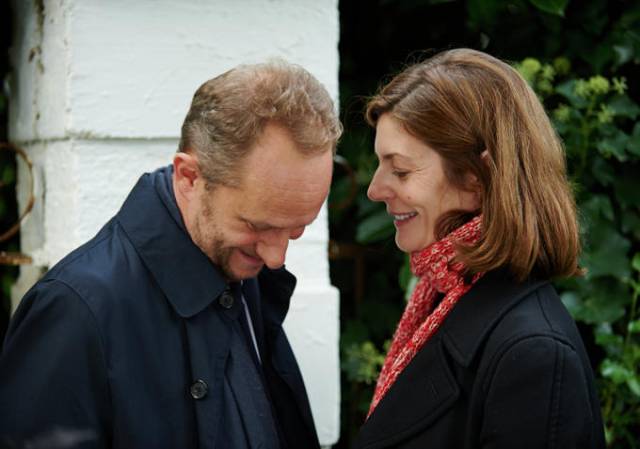
 The passions and desires in Benoît Jacquot’s Three Hearts are so overpowering and grand, that one can almost reach out to the screen and touch them! The unabashedly romantic, adult drama begins in the city of Valence, where Marc (Benoît Poelvoorde) an overworked tax officer, has ended up after missing his train back to Paris. Roaming the streets he meets Sylvie (Charlotte Gainsbourg), a seemingly aloof woman who agrees to show him to the nearest hotel. Bewitched by her appeal, he asks if she’d like to join him for a walk. She agrees and the two spend the kind of night Richard Linklater makes entire movies about. Having realized that they’re each other’s “the one”, they decide to meet a few days later in Paris, he’ll wait for her at the Jardin des Tuileries. However they decide to make this gesture even more romantic by deciding not to exchange phone numbers or even their names for that matter.
The passions and desires in Benoît Jacquot’s Three Hearts are so overpowering and grand, that one can almost reach out to the screen and touch them! The unabashedly romantic, adult drama begins in the city of Valence, where Marc (Benoît Poelvoorde) an overworked tax officer, has ended up after missing his train back to Paris. Roaming the streets he meets Sylvie (Charlotte Gainsbourg), a seemingly aloof woman who agrees to show him to the nearest hotel. Bewitched by her appeal, he asks if she’d like to join him for a walk. She agrees and the two spend the kind of night Richard Linklater makes entire movies about. Having realized that they’re each other’s “the one”, they decide to meet a few days later in Paris, he’ll wait for her at the Jardin des Tuileries. However they decide to make this gesture even more romantic by deciding not to exchange phone numbers or even their names for that matter.
One would think that two middle aged people, so obviously dissatisfied with their lives - that they agree to walk with a stranger for hours - would be more cautious when scheduling appointments, or that they’d seen An Affair to Remember for that matter. Indeed, the encounter never happens and Sylvie moves to America, leaving Marc with nothing but a haunting memory. Eventually, he falls for a sensitive antique shop owner, called Sophie (Chiara Mastroianni), and as the two prepare to get married, the ghost of Sylvie comes back to haunt him in a completely unexpected way.
The beautiful thing about Three Hearts, is that despite its far-fetched assumptions of the lengths people will take in order to find true love, we never really find ourselves questioning the plot as it moves along. In a way, Jacquot is able to emulate the process we go through in real life, as we are overcome by doubt, anxiety and hope, when faced with the possibility of having found a soulmate. Three Hearts is also a magnificent study in cinematic technique, as Jacquot challenges our perception by manipulating elements with such conviction, that we’re unable to fight them, even if we know he is doing with us as he wishes.
From the memorable score by Bruno Coulais, to the unexpected use of a narrator that evokes documentaries and fairy tales, Jacquot sweeps us off our feet, quite often reducing us to tears or nervous laughter. Added to this, there is also the presence of Catherine Deneuve playing a chain-smoking, meal-serving matriarch, who doles out sage advice with a comforting side of profiteroles. How could anyone resist such a confection?